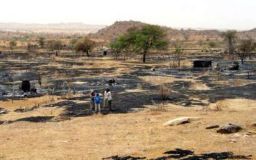ICC prosecutor wants Sudan to cooperate on Darfur
By Evelyn Leopold
UNITED NATIONS, June 30 (Reuters) – The prosecutor of the International Criminal Court told the U.N. Security Council on Wednesday he was stepping up his probe into murder and rape in Darfur but stressed that Sudan needed to cooperate.

|
|
An aerial view of the destroyed Seraf village, in west Darfur along the Sudan and Chad border, April 22, 2005. (Reuters). |
Darfur is the first case the U.N. Security Council has referred to the new International Criminal Court, based in The Hague, Netherlands, but Sudan has said it would not extradite anyone. Instead Khartoum announced it would hold its own trials of 160 suspects.
Prosecutor Luis Moreno-Ocampo of Argentina, in his first appearance before the 15-member Council, said he did not think Sudanese courts would put on trial those most responsible for the atrocities, which legal analysts say may include senior government officials.
“I determined that there are cases that would be admissible in relation to the Darfur situation,” he told the council.
“This decision does not represent a determination on the Sudanese legal system as such, but is essentially a result of the absence of criminal proceedings related to the cases on which I will focus,” said Moreno-Ocampo.
An estimated 180,000 people have died from fighting, hunger and disease in the Darfur, in Sudan’s west, and 2 million have fled their homes to escape slaughter, pillaging and rape in what the United States has termed “acts of genocide.”
Legal experts said Moreno-Ocampo would probably end up prosecuting no more than half a dozen of the top officials and that Sudan courts could try others.
“Of course we will need cooperation from Sudanese authorities and the African Union to ensure security on the ground,” Moreno-Ocampo said.
A U.N-appointed International Commission of Inquiry gave Moreno-Ocampo a list of 51 suspects, including army and government officials, and 2,500 items, including documents, video footage and interview transcripts.
The Security Council decided that Sudan had not brought suspects to justice over the past two years and asked the ICC to do so instead.
The United States, which opposes the court, abstained in the resolution, adopted on March 31.
Britain’s U.N. Ambassador Emyr Jones Parry said some council members suggested the ICC should reach out to Sudan but “it’s the Government of Sudan that has an obligation to cooperate with the ICC, and that’s how we should see it.”
He said it was encouraging that Khartoum wanted to set up another court but only the ICC could handle the main suspects because witnesses did not trust the Sudanese government.
“The reason the ICC is there, is because no one has confidence, victims or even other people in Sudan or certainly the international community that any local court would be prepared to deliver justice, and that’s why we agreed the ICC should go in,” Jones Parry told reporters.
Sudan’s U.N. ambassador, Elfatih Erwa, told reporters that extraditing any Sudanese citizen was a “hypothetical question and when he (Moreno-Ocampo) asks, then we will answer.” The ambassador did say, however, that when Moreno-Ocampo wanted to visit his country, “we will let him in.”
Richard Dicker, a legal counsel for the New York-based Human Rights Watch, said Khartoum had a history of stalling and delaying while pretending to cooperate.
“That’s when the rubber will hit the road. It will then be up to the Sudanese to allow that access and if they fail to that issue will come back to this Security Council,” he said.
